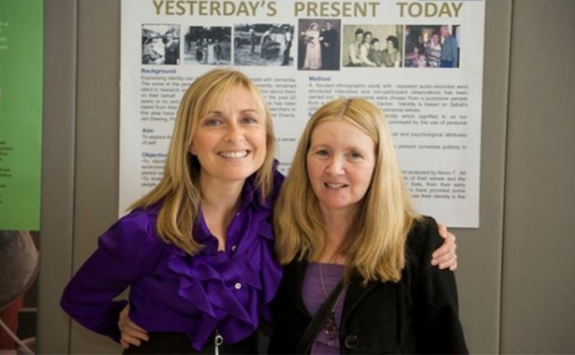Dementia Action Week: Reflections from a Carer, Nurse and Researcher
This Dementia Action Week (19 – 25 May 2025), we spoke to Newcastle alumna Margaret Hence about her experience of caring and learning from people with dementia.
19 May 2025
As a carer, nurse and researcher, I have spent years learning from people with dementia. Dementia Action Week, led by Alzheimer’s Society, invites us to reflect on the lives of those affected by dementia and to consider how we as individuals, professionals and communities can offer better support.
Dementia is an umbrella term that covers over 200 subtypes. Alzheimer’s disease comprises approximately 60% of cases, while other types—such as dementia with Lewy bodies, vascular dementia, and frontotemporal dementia—are less commonly recognized. Recent NHS figures suggest 15,000 people in the UK have a recorded diagnosis of Lewy body dementia, although the real number may be much higher.

The power of human connection
My journey with dementia began during agency care work in clinical and community settings. As a bank mental health nurse, I supported residents in care homes and spent time on a challenging behaviour unit at a local hospital. During induction, I recall singing "It’s a Long Way to Tipperary" with a man I met the day before. His mood visibly lifted, and his wife noticed the difference immediately. That moment reminded me how powerful human connection can be—even through a simple song.
Over time, I developed a special interest in Lewy body dementia, which often includes both cognitive and motor symptoms. I have engaged in individual interactions with residents, accompanied them on walks, participated in singing activities, and gained valuable insights from them.
Later, I undertook a research study exploring identity in dementia. I met regularly with six participants, all of whom had capacity and wanted to share their stories. What they taught me about resilience, selfhood, and change has stayed with me.
My experience as an unpaid carer opened my eyes to the emotional and bureaucratic challenges families face when trying to advocate for a loved one.
Alongside professional roles, I have also been an unpaid carer. That experience opened my eyes to the emotional and bureaucratic challenges families face, particularly when trying to advocate for a loved one across multiple services. The disconnect between professional services and family insight can be deeply harmful. Campaigns like John’s Campaign—which highlights the isolation people with dementia may experience in hospitals—are vital in reminding services that familiar faces are not optional; they are essential.
Contributing to research on campus
For the past year, I have had the privilege of working as an PPI volunteer with a team of researchers from Newcastle University on dementia-related research. I have gained valuable insight into the complexity and dedication behind clinical studies. One such study, COBALT, is a multi-nation trial investigating potential medication for individuals diagnosed with Lewy body dementia. Seeing the care, scientific rigour, and hope behind this work has been a remarkable learning experience and has deepened my appreciation for what research can offer.
Seeing the care, scientific rigour, and hope behind this work has deepened my appreciation for what research can offer.
I have shared my work at home and abroad to raise awareness, particularly around Lewy body dementia, and recently attended a conference in Edinburgh at the Royal College of Physicians. Presenting my work in raising awareness at such a prestigious conference felt good.
Listen to those who live it
I would like to take this opportunity to send warm wishes to everyone living with dementia, and to the families and friends who walk alongside them. As the late humanitarian Dora Moono Nyambe said, “Listen to those who live it.” That, to me, is the heart of good dementia care.
About Dementia Action Week
Dementia affects 850,000 older people in the UK with this number expected to rise to 1.6 million by 2040.
Dementia Action Week is led by the Alzheimer’s Society to raise awareness of the importance of an early diagnosis for people affected by dementia. Diagnosis is vital to give people access to the care, treatment and support they desperately need. Yet, 1 in 3 people with dementia do not have a diagnosis.
To find out more about the symptoms to look out for and the support available, visit the Alzheimer’s Society website below.
Dementia research at Newcastle University
In August 2024, Alzheimer’s Society announced it will be investing just under £3.2 million into funding a new Doctoral Training Centre (DTC) led by Newcastle University to support and nurture dementia researchers at the start of their career.
The DTC will be led by Professor John-Paul Taylor and focus on Lewy body dementia - a move which is essential to progressing much-needed dementia research.
Below, you can read about some of the latest research and projects happening on campus.
